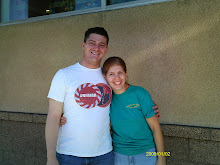I had heard of the Lost Boys of Sudan in passing, but I had no real understanding of what the term meant. I had no real interest in learning about them, either, safe and provided for as I was in my own homeland. I bought the book early in 2008, thinking it would help in a research project about unreached people groups. I was grossly unaware of why the book was written at all and remained painfully blind to the conflict Dau's people faced. The research project eventually took off in a different direction and his book sat forgotten on my dusty, overcrowded bookshelf.
I spied the book again in the hands of a friend in Seoul one recent Sunday. I mentioned how I had the book at home but had never read it. She firmly pushed it toward me and urged that I take it, though she had not yet read it herself. I took the book from her, if only to give me material to read on the subway ride back to Byeongjeom, and started it that night. I found the story so captivating that I finished its 287 pages in 8 days.
The book starts during a midnight shelling raid on Dau's childhood home, a southern Sudanese village named Duk Payeul--a raid which forever altered the course of his life. Scrambling to get outside the hut full of sleeping children that he had been resting fitfully in just moments before, he was pulled to safety by a man he presumed to be his father. For the next hours, they watched and listened together as their village burned. This was 1987, the start of a great civil war for Dau's country and a fourteen-year journey for himself. "I have wondered, more times than I can count," Dau writes in his introduction, "if my friends or I would live to see a new day. Those were the times I thought God had grown tired of us" (7).
From Duk Payeul, Bul Dau traces his path on foot across southern Sudan and into an Ethiopian refugee camp just across the border, called Pinyudu. Along the way, he and the man who rescued him--who wasn't his father, but instead a close family friend named Abraham--encountered first three, then a group of nineteen, then eventually uncounted thousands of young refugees heading towards the camp. Most of these young people were boys under the age of eighteen, just like Bul Dau; girls and adults like Abraham were scarce in the group indeed.
Here was an entire generation of orphaned boys resting on Ethiopia's doorstep. The civil war that led them there pushed them further and further away from their villages and eventually out of their homeland altogether. These child-refugees settled safely in Pinyudu for a peaceful few years, but their conflict was far from over. The government who sponsored raids on their villages pursued the displaced multitude yet again, this time from the Ethiopian side. Bul Dau and his friends were caught off guard by the suddenness of the attack and fled with whatever meager belongings they couldn't afford to abandon, wanted fugitives on the run in a place that should have been their refuge.
While reading I realized with devastating certainty that events that fell upon these Lost Boys happened to my generation. Dau was 13 in 1987, the year his government fired on his village and scattered his family; my twin and I were only 3 and my older brother almost 5. In the refugee camps he relocated to, Dau was among the oldest of the boys; countless thousands of others made the trip as six- and seven-year-olds. By 1991, some of the children who struggled into camp could have been my exact age!
As I devoured page after page of his story, I could identify myself with John in very meaningful ways. I have felt the disorientation that he felt as he endeavored to survive in a country not his own among a people not his own. I have worshipped the same God that he worshipped among his fellow refugees as he danced and sang in his native tongue. And I have lived in the same timeframe, though swaddled in peace while he was shrowded in conflict. Our experiences are not so far removed from each other as what at first might seem. John Bul Dau is my peer, in every sense the word carries. What challenged me the most about his narrative was his unwavering faith in Christ. "War would come to us," he writes in his first chapter, speaking of his native southern Sudanese people. "[B]ut God would be with us in our hour of torment and make us powerful again" (36).
The LORD was surely with Bul Dau and his fellow refugees on their painful sojourn. Though they struggled through such devastating hardship, Dau witnessed the LORD provide for their needs and watch over their care through agencies like the UN and World Vision. As the Lost Boys trekked on foot through hostile southern Sudan, on their way to yet another refugee camp, water and food supply trucks followed them. It was amazing to read how the hand of the LORD rested on them as they journeyed. They had to walk through the difficulty, but God made sure they did not walk alone! While they covered the five hundred miles from a makeshift home in Pochala, Sudan, to refuge across the Kenyan border, Dau and the other boys sang a song in Dinka en route to safety:
"As we go through this wilderness,
We thank you [Jesus] and worship
Because your words we have listened to."
Yes and amen, LORD. Yes and amen.

No comments:
Post a Comment